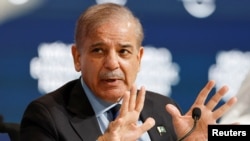Pakistan’s prime minister, Shehbaz Sharif, will lead a high-level delegation to China next week on an official 5-day visit, Islamabad announced Friday.
During the visit that will begin June 4, Sharif will meet Chinese President Xi Jinping and hold delegation-level talks with Chinese Premier Li Qiang, according to the Pakistani Ministry of Foreign Affairs.
Sharif, who will be accompanied by ministers and government officials as well as a group of Pakistani business leaders, will also meet high-ranking government officials and tycoons during the trip that will end June 8.
“The two sides will undertake discussions to further strengthen the all-weather strategic cooperative partnership; upgrade China-Pakistan Economic Corridor; advance trade and investment; enhance cooperation in security and defense, energy, space, science and technology, education; and promote cultural cooperation and people-to-people contacts,” said foreign ministry spokesperson Mumtaz Zahra Baloch at the weekly news briefing.
The visit, that was expected to occur in May, comes at a time when Islamabad is anxiously seeking to ramp up the multibillion-dollar China-Pakistan Economic Corridor, or CPEC, in a bid to spur its ailing economy. However, Beijing is deeply concerned about the safety of Chinese citizens working in Pakistan on the flagship project of its global Belt and Road Initiative.
In recent weeks, Pakistan has ramped up efforts to meet Beijing’s key demand that Islamabad enhance the security of Chinese workers, and arrest and punish the perpetrators of a March suicide attack that killed five Chinese nationals and their Pakistani driver on their way to work at a hydropower project in the mountainous north.
Although no group claimed responsibility for the attack, Pakistan has said the attacker was an Afghan citizen whose handlers were based in Afghanistan.
A high-ranking Pakistani delegation visited Kabul Thursday to share the findings of its probe with the Afghan Taliban and demanded cooperation in arresting the perpetrators. Just days earlier, Islamabad revealed arresting 11 suspects that belonged to the banned militant outfit Tehrik-e-Taliban Pakistan or TTP.
Along with enhancing security protocols for Chinese nationals, Islamabad also recently announced more than $2.5 million in compensation for the families of the slain foreign workers.
Responding to VOA on whether Pakistan was confident it could satisfy China’s security concerns in the upcoming visit, Baloch said she disagreed with the notion that Beijing has “doubts in our approach on the issue of terrorism.”
“There’s already a robust dialogue on terrorism that takes place between Pakistan and China. The two countries have a history of trust and confidence in each other and that makes our relation much more effective,” the spokesperson said.
When asked if Islamabad had formally requested Beijing talk to Kabul to curb cross-border terrorism in Pakistan, Baloch refused to share details.
“I am not in a position to share the internal deliberations and privileged diplomatic conversations between Pakistan and its iron brother China,” she said responding to VOA.
A joint statement after a mid-May meeting between Pakistani and Chinese foreign ministers in Beijing called for international efforts to help Afghanistan “pursue good-neighborliness and firmly combat terrorism, including not allowing its territory to be used for terrorist acts.”
Despite United Nations’ reports and research by Washington-based research groups indicating otherwise, the Afghan Taliban deny the presence of terror groups on their soil.
Commenting on the Pakistani prime minister’s upcoming visit, Chinese Foreign Ministry spokesperson Mao Ning told media Friday that Chinese and Pakistani leaders will “jointly draw up a blueprint for the growth of bilateral relations.”
“China stands ready to work with Pakistan through this visit to make greater progress in our all-weather strategic cooperative partnership and take new steps in the building of an even closer China-Pakistan community with a shared future in the new era,” she added.
Earlier in the week, Mao expressed support for Pakistan’s efforts to investigate the March attack while assuring cooperation in enhancing security for its workers there.
“China supports Pakistan in continuing to get to the full bottom of what happened and hunting down and bringing to justice all the perpetrators,” Mao said. “China will continue to work with Pakistan to strengthen security cooperation and ensure the safety and security of Chinese personnel, projects, and institutions in Pakistan.”
At least 17 Chinese nationals have been killed in targeted attacks in Pakistan in recent years, dealing a blow to CPEC.







